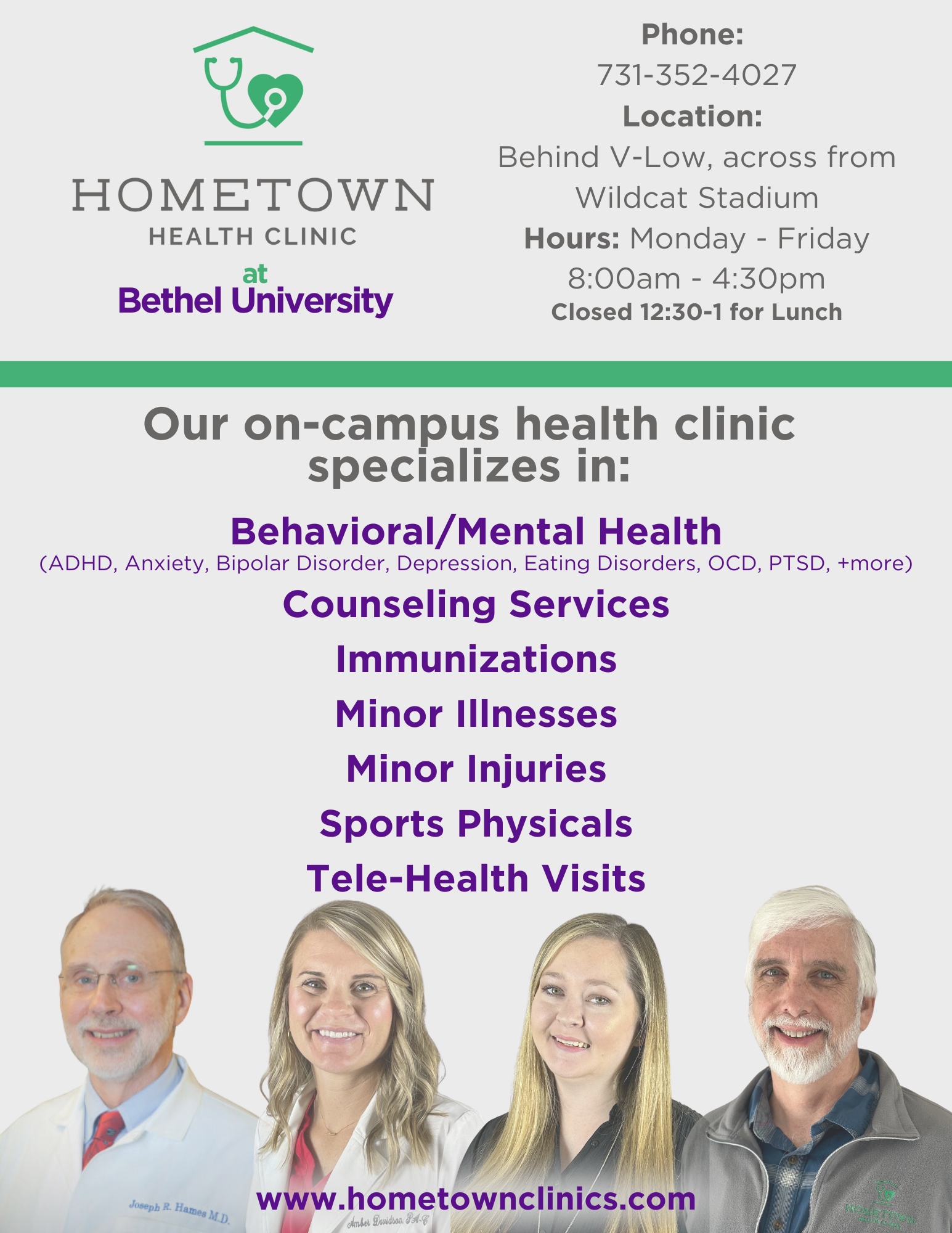Get Help
Taking care of your mental, emotional and spiritual health is one of the most important things you can do for your overall well-being. Whether you need help dealing with an issue, are concerned about a friend or a student’s well-being, or need to report an incident, the information here can help you make the best decision possible.
Sexual Misconduct & Relationship Violence
Bethel University is committed to providing an environment free from sex discrimination, sexual misconduct, and relationship violence and to ensure the accessibility of appropriate grievance procedures for addressing these complaints. To make a report, see the page below.
Counseling Services
Hometown Health Clinic has counselors available in the Student Health Center. The counselors are available to see students, faculty, and staff for any type of mental health concern. Also, counselors are available at the main Hometown Health Clinic site in McKenzie at other times during the week. Call 731-352-4027 to schedule an appointment on campus and 731-352-7907 for off campus appointments.

Safety & Security
The mission of Bethel’s Department of Safety and Security is to maintain a safe and secure environment for all students, faculty, and staff belonging to the Bethel University community, to help establish and maintain an environment which will allow for the mental, physical, social and spiritual development of all students, and to help provide an atmosphere in which freedom of cultural expression and the continued growth of the whole student is possible within the Bethel Campus Community.
Disability Services
The Office of Disability Services (ODS) is designed to coordinate and administer services and accommodations for students with documented disabilities. Our goal is to provide individuals with documented disabilities fair access to programs, services, and activities here at Bethel University.
Chaplains
The Chaplains are available for counseling and a listening ear to share concerns.
Health Clinic
The on-campus health clinic provides services for minor injuries and illnesses.
Clothing Closet & Food Pantry
The Wildcat Clothing Closet and Food Pantry offers clothing and non-perishable food items to students in need.
Alcohol & Drug Policy
The University expects its students to obey the law. Therefore, a violation of alcohol or drug laws while admitted to the University, wherever that violation occurs, is a violation of the University’s expectations. Read Bethel's complete Alcohol & Drug Policy.
eCHECKUP TO GO
eCHECKUP is a brief self-assessment tool available for use by students to examine their alcohol use. eCHECKUP provides immediate personalized feedback about individual drinking patterns, specific health and personal consequences, unique personal and family risk factors, and campus and community support, and emergency services. Answers are CONFIDENTIAL. No name is attached to the form, and no personally identifiable information from this survey will be stored.
Give Help
Suicide Warning Signs
There is no typical suicidal person. No age group, ethnicity, or background is immune. Fortunately, many troubled individuals display behaviors deliberately or inadvertently that signal their suicidal intent. Recognizing the warning signs and learning what to do next may help save a life. Some of these warning signs include:
- Talking about suicide, death, and/or no reason to live
- Preoccupation with death and dying
- Withdrawal from friends and/or social activities
- Experience of a recent severe loss (especially a relationship of any kind, e.g. friend, family, pet, etc.) or the threat of a significant loss
- Experience or fear of a situation of humiliation or failure
- Drastic changes in behavior
- Loss of interest in hobbies, work, school, etc.
- Preparation for death by making out a will (unexpectedly) and final arrangements
- Giving away prized possessions
- Previous history of suicide attempts, as well as violence and/or hostility
- Unnecessary risks; reckless and/or impulsive behavior
- Loss of interest in personal appearance
- Increased use of alcohol and/or drugs
- General hopelessness
- Unwillingness to connect with potential helpers
